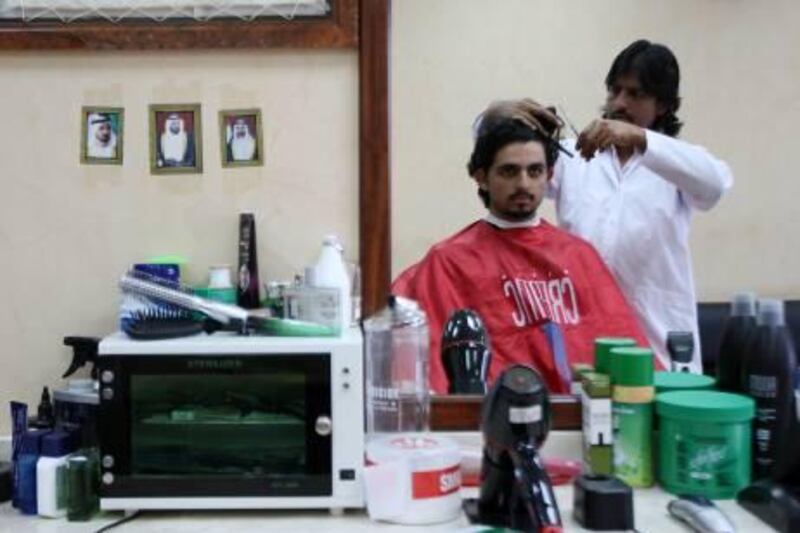DUBAI // Hassan Saeed sits comfortably in a salon chair as his barber snips away with scissors that have touched many other heads.
He is not worried about catching germs from the instruments because he is certain they have all been disinfected.
"None of my friends bring their own tools to barber shops," says Hassan, 17, a student from Sudan at Silver Gents Salon in Barsha. "I am happy with the barber using his own scissors and comb because I can see that they have been cleaned well."
His barber, Irfan Ali Sultan of Pakistan, points at the ultraviolet steriliser and a glass cylinder containing a special solution used to disinfect combs. He says he has no problem with customers who want to use their own tools.
"I have a lot of customers and yes, some of them bring their own scissors or comb," Mr Sultan says. "Inspectors from Dubai Municipality come frequently to check if we are sterilising our equipment with a special solution and using the UV steriliser box."
His salon is in the majority. The Public Health and Safety Department of Dubai Municipality says 74 per cent of the 1,271 men's salons based in Dubai are in compliance with the Government's cleanliness standards.
Most have promptly corrected any violations found, says Redha Hassan Salman, the department's director.
Failing to properly disinfect the tools could lead to the spread of infectious diseases such as hepatitis B, experts say.
"Tools must be kept in an ultraviolet box and the disinfectant solution must be changed periodically and kept clean," Mr Salman says. "These are just a few examples of the rules."
Municipal inspectors are busily ensuring compliance. Last year, the department carried out 3,721 inspections of barber shops. In the first four months of this year, the inspectors carried out 1,555 visits.
Salons must use approved disinfectants and workers must have occupational health cards to prove they are not carrying any communicable diseases, Mr Salman says.
"They should also change the razor for every new customer and the tools must be washed, dried and disinfected," he says. "They should have enough towels … disposable materials are preferred."
Samnas Ali, an Indian barber at Merqab Gents Salon in Barsha, says his clients make cleanliness a priority.
"We get customers that are concerned about cleanliness and do not want to share instruments with anyone else, but I do not have a problem with that at all," Mr Ali says.
"We change the razors and disinfect our tools properly, so even if customers are very particular that is all right with me."
Not all barber shops, however, are models of cleanliness.
According the municipality's health and safety department, some 2,870 warnings have been handed out since May of last year to salons because they violated hygiene and safety rules.
"The public and workers have variable knowledge and awareness of the risks of getting infected by a virus or skin disease in barber shops," Mr Salman says.
"As an indication of this, many people keep their own tools in special bags or request disposable items, which is also encouraged by the municipality."
Dr Oskar Janata, the chairman of the Institute of Clinical Laboratory Service at Al Ain Hospital, explains that items such as razors and shavers can spread all kinds of infectious diseases.
"They were identified as the cause for the spread of some resistant pathogens," Dr Janata says, pointing specifically to methicillin-resistant staphylococcus aureus (MRSA), which is a type of bacterium responsible for several infections that are difficult to treat.
Illnesses associated with these bacteria can range from minor skin infections to life-threatening ailments such as pneumonia and meningitis, experts say.
"Community-associated MRSA can be transferred from shared razors, combs, towels, and can cause severe skin infections," Dr Janata says.
Shavers can also transmit blood-borne pathogens. Although viruses are not able to multiply outside of the body, they are stable on environmental surfaces for up to seven days, according to the Control of Communicable Diseases Manual, which is published by the American Public Health Association.
"The problem with all these pathogens is that you can't see the cleanness even in the case of bloody contamination," Dr Janata says. "If you wipe off the blood, the spot can remain infectious with hepatitis B. Therefore, you have to rely on the compliance of the staff."
A customer at Merqab Gents Salon notes that most men are vigilant when it comes to hygiene at salons.
"I do not bring my tools but I do check for myself if everything is hygienic - obviously most of us want to be sure that everything is clean," says Sanit Zacharias, 29, a sales engineer from India.
Mohsen Ayoub, who has worked as a hairdresser for 15 years, says awareness is growing.
"Inspectors from the municipality can tell right away when a salon is clean and adheres to the hygiene standards, but they do routine visits to ensure that the sterilising solution is being changed and everything is as it should be," says Mr Ayoub, a Moroccan barber at Mohu gents' salon.
"I have worked as a hairdresser for 15 years and when I first started I do not think people in general knew as much as they do today about the diseases and bacteria that can be transmitted.
"If my customers want to use their own tools, I would readily oblige - whatever makes my customer comfortable."
[ balqabbani@thenational.ae ]
melshoush@thenational.ae





